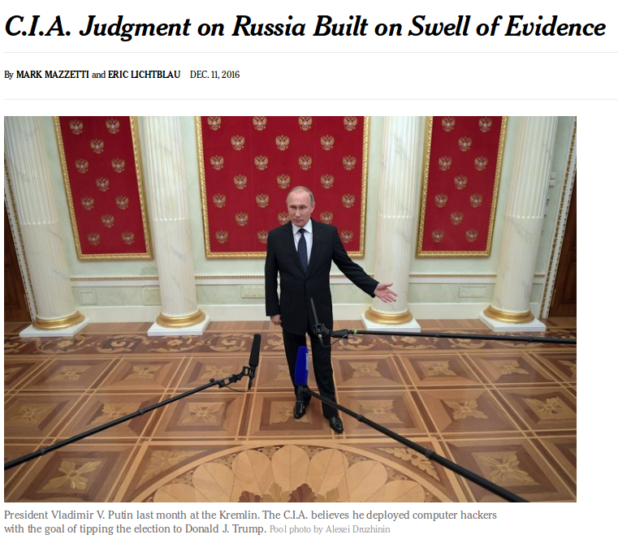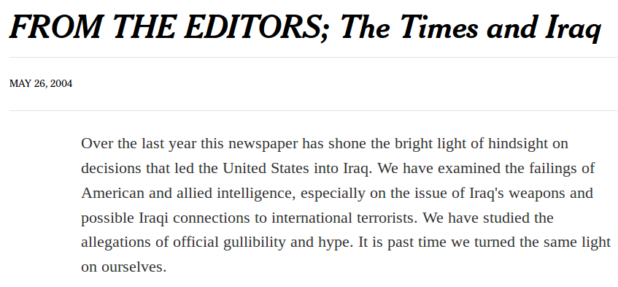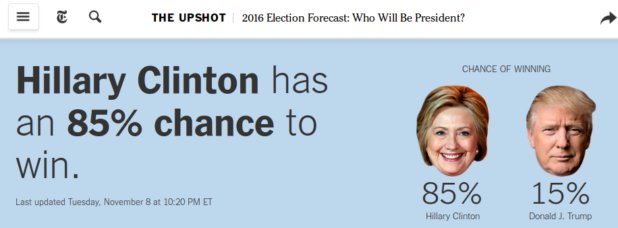Andrew Anglin
Daily Stormer
December 12, 2016
Today, the New York Times has a big article up entitled “C.I.A. Judgment on Russia Built on Swell of Evidence.”
Suspiciously, they present absolutely zero evidence in the article.
Both intelligence and law enforcement officials agree that there is a mountain of circumstantial evidence suggesting that the Russian hacking was primarily aimed at helping Mr. Trump and damaging his opponent, Hillary Clinton.
In July, the infiltration of the Democratic National Committee’s computer servers produced embarrassing emails and other internal party documents, the publication of which caused a backlash that led to the resignation of the committee’s chairwoman, Debbie Wasserman Schultz, and her top staff. Just weeks before the election, hacked emails from the account of John D. Podesta, Mrs. Clinton’s campaign manager, were made public and produced numerous stories about the internal dynamics of the campaign. That hack also produced the text of speeches Mrs. Clinton had given to Wall Street banks.
American intelligence officials believe that Russia also penetrated databases housing Republican National Committee data, but chose to release documents only on the Democrats. The committee has denied that it was hacked.
Beyond the specific targets of the hacks, American officials cite broad evidence that Mr. Putin and the Russian government favored Mr. Trump over Mrs. Clinton.
After demonstrators marched through Moscow in 2011 chanting “Putin is a thief” and “Russia without Putin,” Mr. Putin publicly accused Mrs. Clinton, then the secretary of state, of instigating the protests. “She set the tone for some actors in our country and gave them a signal,” he said.
More generally, the Russian government has blamed Mrs. Clinton, along with the C.I.A. and other Ahttps://www.youtube.com/watch?v=XLZ1epenzFUmerican officials, for encouraging anti-Russian revolts during the 2003 Rose Revolution in Georgia and the 2004 Orange Revolution in Ukraine. What Americans saw as legitimate democracy promotion, Mr. Putin saw as an unwarranted intrusion into Russia’s geographic sphere of interest, as the United States once saw Soviet meddling in Cuba.
By contrast, Mr. Trump and Mr. Putin have had a very public mutual admiration society. In December 2015, the Russian president called Mr. Trump “very colorful” — using a Russian word that Mr. Trump and some news outlets mistranslated as “brilliant” — as well as “talented” and “absolutely the leader in the presidential race.” Mr. Trump called Mr. Putin “a strong leader” and further pleased him by questioning whether the United States should defend NATO members that did not spend enough on their militaries.
Russian television, which is tightly controlled by the government, has generally portrayed Mr. Trump as a strong, friendly potential partner while often airing scathing assessments of Mrs. Clinton.
So the evidence that Russia did the hack is that Russia would have preferred if Trump won?
This is like saying “the evidence that the man raped her is that he thought she was attractive.”
https://www.youtube.com/watch?v=e4pk1rAPH8k
Is there other evidence?
And yet, there is skepticism within the American government, particularly at the F.B.I., that this evidence adds up to proof that the Russians had the specific objective of getting Mr. Trump elected.
A senior American law enforcement official said the F.B.I. believed that the Russians probably had a combination of goals, including damaging Mrs. Clinton and undermining American democratic institutions. Whether one of those goals was to install Mr. Trump remains unclear to the F.B.I., he said.
The official played down any disagreement between the F.B.I. and the C.I.A., and suggested that the C.I.A.’s conclusions were probably more nuanced than they were being framed in the news media.
The agencies’ differences in judgment may also reflect different methods of investigating the Russian interference. The F.B.I., which has both a law enforcement and an intelligence role, is held to higher standards of proof in examining people involved in the hacking because it has an eye toward eventual criminal prosecutions. The C.I.A. has a broader mandate to develop intelligence assessments.
Law enforcement officials said that if F.B.I. agents had the evidence to charge Russians with specific crimes, they would do so. The F.B.I. and federal prosecutors have already gone aggressively after Russian hackers, including two men detained in Thailand and the Czech Republic whom the United States is trying to extradite.
Russia has tried to block those efforts and has accused the United States of harassing its citizens.
The F.B.I. began investigating Russia’s apparent attempts to meddle in the election over the summer. Agents examined numerous possible connections between Russians and members of Mr. Trump’s inner circle, including former Trump aides like Paul Manafort and Carter Page, as well as a mysterious and unexplained trail of computer activity between the Trump Organization and an email account at a large Russian bank, Alfa Bank.
At the height of its investigation before the election, the F.B.I. saw some indications that the Russians might be explicitly seeking to get Mr. Trump elected, officials said, and investigators collected online evidence and conducted interviews overseas and inside the United States to test that theory.
The F.B.I. was concerned enough about Russia’s influence and possible connections to the Trump campaign that it briefed congressional leaders — including Senator Harry Reid, the Nevada Democrat and Senate minority leader — on some of the evidence this summer and fall. Mr. Reid, in particular, pressed for the F.B.I. to find out more and charged that the agency was sitting on important information that could implicate Russia.
But the agency’s suspicions about a direct effort by Russia to help Mr. Trump, or about possible connections between the two camps, appear to have waned as the investigation continued into September and October. The reasons are not entirely clear, and F.B.I. officials declined to comment.
Now that a partisan squall has erupted over exactly what role Russia played in influencing the election, there is growing momentum among both Republicans and Democrats on Capitol Hill to have a congressional investigation.
“I’m not trying to relitigate the election,” said Senator Angus King, independent of Maine, who is one of the lawmakers calling for such an investigation. “I’m just trying to prevent this from happening again.”
That’s it.
So, it is certainly a misleading headline. They do not present any evidence. No one is presenting any evidence, beyond “yeah but Russia would prefer a candidate that didn’t want to start a world war with them though.”
Part of the problem is that it is impossible that there is any evidence. One would hope that the media would point this out – that a hacking attribution is virtually impossible. But they’re not doing that.
And they aren’t even hinting at what the evidence could be. They are relying solely on their own power as a mainstream media source, as well as the relatively lack of knowledge that the general public has about hacking. They aren’t telling you what Trump is telling you, which is that far from requiring state power to get access to these emails, the operation could have been done by a single individual anywhere in the world.
Deja Vu All Over Again
Let’s remember – as Trump has asked us to remember – that this is the same CIA which claimed that Saddam Hussein had built a nuclear weapon and was planning to preemptively attack the US with it – and that the only solution to this incoming nuclear death was to invade the country, a decision that cost us trillions of dollars and thousands of American lives. That pointless war, based on this fake intelligence, destabilized the entire Middle East and resulted in the creation of ISIS, which has terrorized the entire Western world.
The New York Times was instrumental in convincing the people that the CIA’s analysis of the Hussein plan to nuke us was accurate.
After it was shown that in fact Hussein had no nukes, and was not planning to attack America – in fact, Iraq was just a normal, primitive, third-world desert hellhole – the New York Times issued an apology in 2004.
In the apology, written by the Times editorial board, they said they had done a review of their coverage leading up to the war, and found that there was actually no evidence while they were claiming there was.
New York Times, May 26, 2004:
In doing so — reviewing hundreds of articles written during the prelude to war and into the early stages of the occupation — we found an enormous amount of journalism that we are proud of. In most cases, what we reported was an accurate reflection of the state of our knowledge at the time, much of it painstakingly extracted from intelligence agencies that were themselves dependent on sketchy information. And where those articles included incomplete information or pointed in a wrong direction, they were later overtaken by more and stronger information. That is how news coverage normally unfolds.
But we have found a number of instances of coverage that was not as rigorous as it should have been. In some cases, information that was controversial then, and seems questionable now, was insufficiently qualified or allowed to stand unchallenged. Looking back, we wish we had been more aggressive in re-examining the claims as new evidence emerged — or failed to emerge.
This is the exact thing that they are doing right now – reporting “controversial information” and both “insufficiently qualifying it” and “allowing it to stand unchallenged.” They are not aggressively examining these claims from the CIA, in the same way they didn’t examine the agency’s claims 15 years ago, even while evidence is failing to emerge.
Much more recently – last month – the New York Times apologized for claiming Hillary Clinton had an 85% chance to win the Presidential election.
The New York Times is not a credible news source. In fact, it would not be unreasonable to label them “fake news,” as they have such a horrible track record of lying in order to push a political agenda.
What is the Point of This?
More interesting than any of the details of the Russian hacker hoax itself is the motivation behind it.
The media and government have given up on attempting to claim that Russia hacked the polls themselves, and are now just trying to pin Wikileaks on them.
What if they were able to prove this? Again, I don’t think it is possible that even if Russia did do it, it is possible to prove it, but what if they could? What would it mean?
The worst case scenario, obviously, is that they would attempt to use this to claim the results of the election are invalid.
This seems nutty, but I just can’t see what else they could be aiming for with all of this. What would be the point of this elaborate hoax otherwise?
I suppose it could simply be to try and undermine Trump in the eyes of the people, but there would be a lot of other ways they could accomplish that – ways that wouldn’t necessarily require the CIA to make these fake intelligence claims.
Few people are openly saying “the results are invalid and need to be discounted” or “do the election again” – but some are.
https://www.youtube.com/watch?v=XLZ1epenzFU
We are going to be hearing more of this. Possibly this week, the media and certain politicians such as Harry Reid and John McCain, will come out with an organized attack, demanding that the election be done over.
There are 38 days until Trump’s inauguration.
Obama has said he wants a report from the CIA and other intelligence agencies before that date.
There is at least a chance that he will come out with the claim that the election was invalid and must be done over.
And that is when things will get very interesting.



